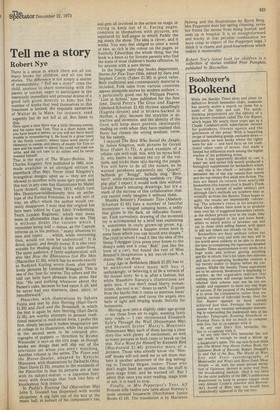Bookbuyer's
Bookend
While the Sunday Times plots and plans its definitive British bestseller chart, someone has quietly stolen a march on them for a tenth of the time and cost. The quickthinking perpetrators are the editors of a little-known newsheet called The Gee Report, which began life nearly three years ago as a Claude Cockburn-style subscription circular for publishers, literary agents and the gentlemen of the press. With a beguiling recipe of tantalising gossip, exclusive news — particularly on new books where the rights were for sale — and hard facts on the traditional taboo topic of money, Gee made a limited but influential mark among the higher maches of the publishing scene.
Now it has apparently decided to cast a wider net, and earlier this month produced a fortnightly suppliement for booksellers which — and this is the clinch — includes a dual bestseller list of the top twenty-five novels and the top twenty-five adult non-fiction. The
lists are based on returns from nearly100 booksellers (the nearest rival is Smith's Trade News with a sample of under twenty) and although Gee's methods are nowhere near as scientific as those the Sunday Times hopes to apply, the results are impressively convinc• ing. The scheme's virtue is its simplicity. What Gee's editors have done is to produce
their own list of suggested bestsellers (which, as the slickest private eyes in the trade, they seem well-equipped to do) and leave book sellers to award points of between one and ten to those titles selling fastest, with space to add any others not already on the list.
Booksellers are busy animals (often too busy to serve you) and with the best will in the world seem unlikely to be able to devote
the time to completing the rigorouslyodetailed Sunday Times questionnaire every week, on a
huge scale, and without getting anything
specific in return. Gee's list takes two minutes and each co-operating bookseller receives a top twenty poster to display before his cus tomers. Whilst the Sunday Times aspirations
are to be admired. Bookbuyer is beginning to wonder, as the organisers indicate that nothing concrete will emerge before March,
whether their scheme may not be too unwieldy and expensive to have any real hope
of success. If the purpose of the bestseller list
is to show the comparative, rather than statistical, success of indivudal books, then the Gee Report appears to have already achieved just that. Perhaps the realistic answer for any national newspaper interesting in superseding the inadequate lists of the Sunday Telegraph, Evening Standard or Evening News, is not so much to compete with Gee, but to co-operate with it.
At any rate Gee's first bestseller list. but to co-operate with it. At any rate Gee's first bestseller list, out
last week, is enough to send a shiver up
a booklover's spine. The top non-fiction titles are: The Brand New Monty Python Book, the Guinness Book of Records. Robert Dougall's In and Out of the Box, The World at War. Eric and Ernie (autobiography of Morecambe and Wise) and More Goon Show Scripts — all, with the usual annual excep tion of Guinness, derived in some way from the broadcasting medium. (Had it not been for the utter inability of the BBC's publication department to keep in proper supply their own Alistair Cooke's America and Bronowski's Ascent of Man, they too would have undoubtedly appeared in the top ten).


































 Previous page
Previous page